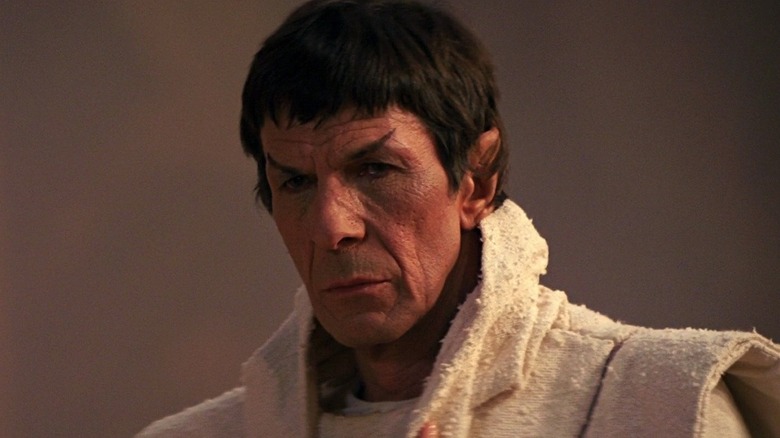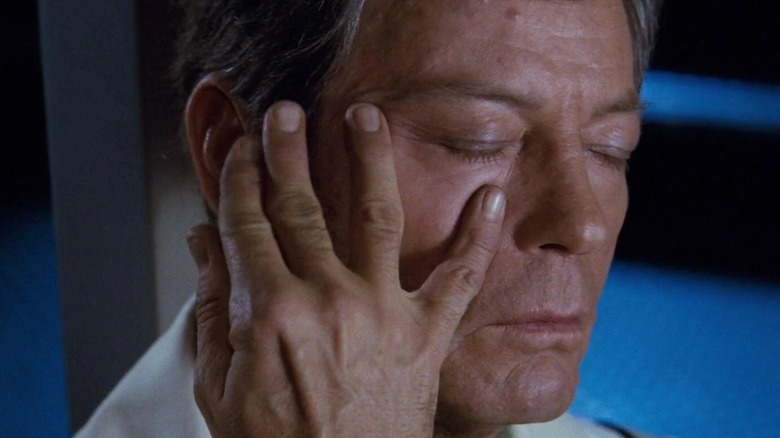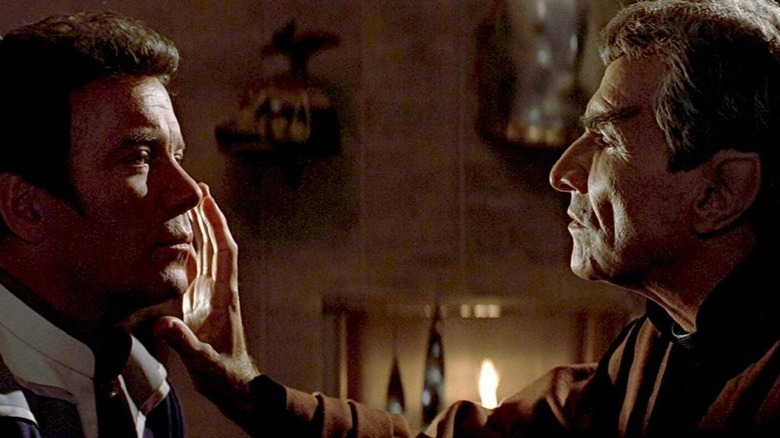Leonard Nimoy Changed Star Trek History With One Mysterious Improvised Word
I watch a lot of movies, but even ones that stab at my heart rarely make me tear up. "Star Trek II: The Wrath of Khan" is, to quote Hayley Williams of Paramore, the only exception.
Spock (Leonard Nimoy) dies to save the Enterprise and his comrades, taking a lethal dose of radiation when giving the ship's engine a boost. He passes on after a final conversation with his best friend James Kirk (William Shatner). It's fair to say Nimoy was a better actor than Shatner, yet it's the latter who affects me most here. From the way his voice trembles as he yells Spock's name to the quiet heartbreak across his face as he watches his friend's final moments of pain, it's the most empathic acting I've ever seen from Shatner.
So, there's a part of me that will always resent the next film, "Star Trek III: The Search for Spock," for undoing this. That said, this wasn't an abrupt change of plan. Even when "Wrath of Khan" first opened in June 1982, Oregonian newspaper the Register-Guard reassured Trekkies with the headline, "Spock Dies — But Wait! He'll Be Back."
See, Nimoy went in thinking "Wrath of Khan" would be the last "Star Trek" movie, and he figured Spock might as well "go out in a blaze of glory." Writer Harve Bennett had other ideas. According to the DeForest Kelley biography "From Sawdust to Stardust" by Terry Lee Rioux, Bennett asked Nimoy to "add a thread" to the death scene by having Spock mind meld with Dr. McCoy (played by Kelley). Nimoy himself suggested that Spock tell McCoy to "remember," but neither Nimoy nor Bennett thought through the full implications of the dialogue.
That one line set the course for the sequel.
Remember Spock
Nimoy writes in his 1995 memoir "I Am Spock" about how seeing Spock's death at a "Wrath of Khan" studio screening affected him, especially since he felt like a "co-conspirator" in the character's death. He became so sad that he almost bolted from the theater, but didn't want to give the false impression he disliked the movie.
But as Nimoy watched the film, he also started to notice "how open" the door was for Spock's return, from "remember" to an ending scene (filmed after test screenings to alleviate the somberness) of Spock's coffin landed safely on the newly-born Genesis planet. A realization struck Nimoy: "I'm going to be getting a call from Paramount!"
Since "Wrath of Khan" was a success, Nimoy indeed got that call. He not only agreed to return for "Star Trek III," but asked to direct it as well — his request was granted. Shatner told USA Today in 2017 that he believes Nimoy went along with killing Spock in part to get leverage to direct, but Nimoy himself never confirmed this.
Bennett would also return to write the script for what became "The Search for Spock" and had to answer the challenge of reviving everyone's favorite Vulcan. As he recounted to Mark A. Altman and Edward Gross for their book "The Fifty-Year Mission":
"One, there is a casket on a planet that has been created by the reformation of life forces, and life has been created from death. Two, 'There are always possibilities.' Three, before he died, Spock said, 'Remember.' Remember what? The puzzle was solved so easily that I think seventeen other people could have written the script to 'Star Trek III.'"
So yes, the Genesis Planet (born from a life-creating device) restores Spock's body to life, with the Vulcan rapidly re-aging from childhood throughout the film. But what about his oh-so-logical mind?
The Genesis of The Search for Spock
Bennett came up with the idea of a Vulcan "Katra," or a consciousness, reasoning that if Vulcans can telepathically link their minds to others, then they can surely transfer the sum of their self during a meld. When a Vulcan dies, they ceremoniously transfer their Katra via a mind meld so that their knowledge may be preserved. That's what Spock did to McCoy; "remember" was a plea for the doctor to remember all that Spock himself did.
Early in the film, Kirk comes across McCoy possessed by Spock's Katra, pleading to be taken home to planet Vulcan: "Jim, help me. You left me on Genesis — why did you do that?" Soon afterward, Kirk is visited by Spock's father Sarek (Mark Lenard), who mistakenly assumes that Kirk carries the Katra. But since Kirk and Spock were physically separated by a radiation shield when the latter died, a mind meld (carried out via touch) was impossible.
Like Bennett figuring out how to revive Spock, Kirk pieces together what's happened and brings his crew back to Genesis to retrieve Spock's body and free McCoy from Katra-induced madness (after all, Kirk isn't going to lose his other best friend). Then, at Vulcan, Spock's Katra is returned to his born-again body. This unique two-factor circumstance also handily explains why all Vulcans aren't resurrected via Katra transference.
Bennett adds in "The Fifty-Year Mission" that a viewer can easily assume from the clues of "Wrath of Khan" and their payoff in "The Search for Spock" that the exact nature of Spock's return was already planned when the former film was shot. However, that was not the case.
All Bennett needed to write Spock's resurrection was some imagination, but Leonard Nimoy inadvertently made his job a lot easier with his suggestion of "Remember."


